 W
WJohn Adair was an American pioneer, soldier, and politician. He was the eighth Governor of Kentucky and represented the state in both the U.S. House and Senate. A native of South Carolina, Adair enlisted in the state militia and served in the Revolutionary War, during which he was twice captured and held as a prisoner of war by the British. Following the War, he was elected as a delegate to South Carolina's convention to ratify the United States Constitution.
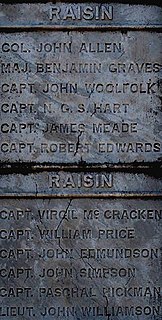 W
WJohn Allen was a United States politician and army officer who was killed in the War of 1812.
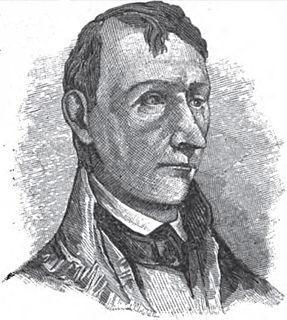 W
WBland Ballard was a soldier and statesman from Kentucky.
 W
WRobert Emmett Bledsoe Baylor was an ordained Baptist minister, district judge, politician and co-founder of Baylor University.
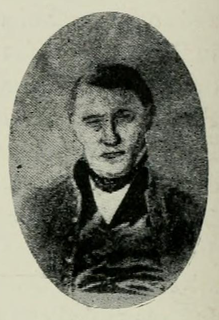 W
WNathan Boone (1780–1856) was a veteran of the War of 1812, a delegate to the Missouri constitutional convention in 1820, and a captain in the 1st United States Regiment of Dragoons at the time of its founding, eventually rising to the rank of lieutenant colonel. Nathan was the youngest son of Daniel Boone.
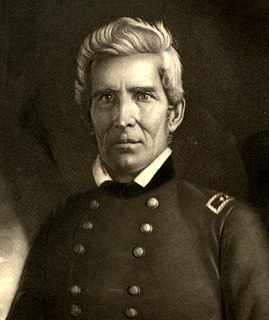 W
WWilliam Orlando Butler was a U.S. political figure and U.S. Army major general from Kentucky. He served as a Democratic congressman from Kentucky from 1839 to 1843, and was the Democratic vice-presidential nominee under Lewis Cass in 1848.
 W
WGreen Clay was a United States businessman, planter, and politician from Kentucky; he served in the American Revolutionary War and was commissioned as a general to lead the Kentucky militia in the War of 1812. He was believed to be one of the wealthiest men of the state, owning tens of thousands of acres of land, many slaves, several distilleries, a tavern, and ferries.
 W
WHenry Clay Sr. was an American attorney and statesman who represented Kentucky in both the U.S. Senate and House of Representatives. He was the seventh House Speaker as well as the ninth Secretary of State, also receiving electoral votes for president in the 1824, 1832, and 1844 presidential elections. He helped found both the National Republican Party and the Whig Party. For his role in defusing sectional crises, he earned the appellation of the "Great Compromiser" and was part of the "Great Triumvirate" of Congressmen, alongside fellow Whig Daniel Webster and John C. Calhoun.
 W
W'General' Elijah Combs, is the son of John Combs and his wife, Nancy Harding. He migrated to Kentucky from North Carolina in 1792 bringing with him his wife and several slaves. He is listed as deeding roughly 10 acres for what became the Town of Hazard to the town in 1826.
 W
WJohn Jordan Crittenden was an American statesman and politician from the U.S. state of Kentucky. He represented the state in the U.S. House of Representatives and the U.S. Senate and twice served as United States Attorney General in the administrations of William Henry Harrison, John Tyler, and Millard Fillmore. He was also the 17th governor of Kentucky and served in the state legislature. Although frequently mentioned as a potential candidate for the U.S. presidency, he never consented to run for the office.
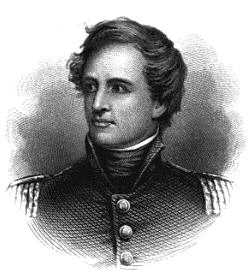 W
WGeorge Croghan was an American soldier. He was born at the Locust Grove farm in what is now Louisville, Kentucky and died in New Orleans, Louisiana. He was a recipient of the Congressional Gold Medal.
 W
WJohn Denny was an American pioneer and politician.
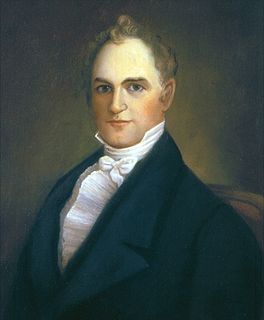 W
WJoseph Desha was a U.S. Representative and the ninth governor of the U.S. state of Kentucky. After the revocation of the Edict of Nantes, Desha's Huguenot ancestors fled from France to Pennsylvania, where Desha was born. Eventually, Desha's family settled near present-day Gallatin, Tennessee, where they were involved in many skirmishes with the Indians. Two of Desha's brothers were killed in these encounters, motivating him to volunteer for "Mad" Anthony Wayne's campaign against the Indians during the Northwest Indian War. Having by then resettled in Mason County, Kentucky, Desha parlayed his military record into several terms in the state legislature.
 W
WHenry Grider was a United States Representative from Kentucky. He was born in Garrard County, Kentucky. He pursued an academic course, studied law, and was admitted to the bar and commenced practice in Bowling Green, Kentucky.
 W
WPaschal Hickman was an American military officer who was killed in the Massacre of the River Raisin, an important event in the War of 1812. Hickman County, Kentucky is named for him.
 W
WSamuel Hopkins was a U.S. Representative from Kentucky.
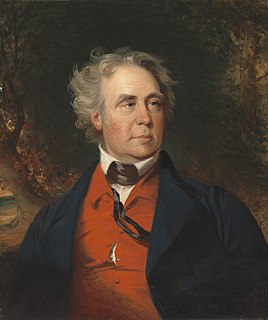 W
WRichard Mentor Johnson was an American lawyer and politician who served as the ninth vice president of the United States, serving from 1837 to 1841 under President Martin Van Buren. He is the only vice president elected by the United States Senate under the provisions of the Twelfth Amendment. Johnson also represented Kentucky in the U.S. House of Representatives and Senate. He began and ended his political career in the Kentucky House of Representatives.
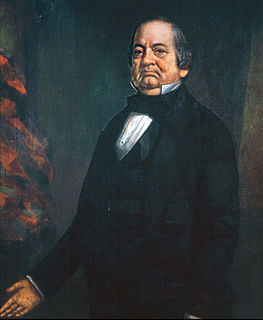 W
WRobert Perkins Letcher was a politician and lawyer from the US state of Kentucky. He served as a U.S. Representative, Minister to Mexico, and the 15th Governor of Kentucky. He also served in the Kentucky General Assembly where he was Speaker of the House in 1837 and 1838. A strong supporter of the Whig Party, he was a friend of Henry Clay and John J. Crittenden.
 W
WGeorge Madison was the sixth Governor of Kentucky. He was the first governor of Kentucky to die in office, serving only a few weeks in 1816. Little is known of Madison's early life. He was a member of the influential Madison family of Virginia, and was a second cousin to President James Madison. He served with distinction in three wars – the Revolutionary War, Northwest Indian War, and War of 1812. He was twice wounded in the Northwest Indian War, and in the War of 1812 he was taken prisoner following the Battle of Frenchtown in Michigan.
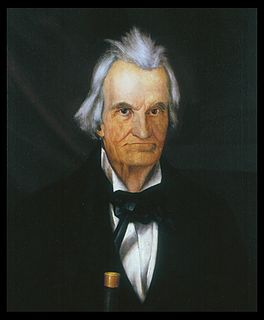 W
WThomas Metcalfe, also known as Thomas Metcalf or as "Stonehammer", was a U.S. Representative, Senator, and the tenth Governor of Kentucky. He was the first gubernatorial candidate in the state's history to be chosen by a nominating convention rather than a caucus. He was also the first governor of Kentucky who was not a member of the Democratic-Republican Party.
 W
WAbel Claypole Pepper was an American politician, law enforcement officer, and Indian agent. During his long career in public service, Pepper oversaw the removal of American Indians in Indiana, Illinois, Michigan and Wisconsin on behalf of the United States Department of War, signing treaties with Indigenous peoples, which eventually resulted in the Potawatomi Trail of Death. He served in the Indiana House of Representatives three times and was a United States Marshall.
 W
WCharles Scott was an 18th-century American soldier who was elected the fourth Governor of Kentucky in 1808. Orphaned in his teens, Scott enlisted in the Virginia Regiment in October 1755 and served as a scout and escort during the French and Indian War. He quickly rose through the ranks to become a captain. After the war, he married and engaged in agricultural pursuits on land left to him by his father, but he returned to active military service in 1775 as the American Revolution began to grow in intensity. In August 1776, he was promoted to colonel and given command of the 5th Virginia Regiment. The 5th Virginia joined George Washington in New Jersey later that year, serving with him for the duration of the Philadelphia campaign. Scott commanded Washington's light infantry, and by late 1778 was also serving as his chief of intelligence. Furloughed at the end of the Philadelphia campaign, Scott returned to active service in March 1779 and was ordered to South Carolina to assist General Benjamin Lincoln in the southern theater. He arrived in Charleston, South Carolina, just as Henry Clinton had begun his siege of the city. Scott was taken as a prisoner of war when Charleston surrendered. Paroled in March 1781 and exchanged for Lord Rawdon in July 1782, Scott managed to complete a few recruiting assignments before the war ended.
 W
WSolomon Porcius Sharp was an American attorney and politician, serving as attorney general of Kentucky and a member of the United States Congress and the Kentucky General Assembly. His murder by Jereboam O. Beauchamp in 1825 is referred to as the Beauchamp–Sharp Tragedy or "The Kentucky Tragedy."
 W
WIsaac Shelby was the first and fifth Governor of Kentucky and served in the state legislatures of Virginia and North Carolina. He was also a soldier in Lord Dunmore's War, the American Revolutionary War, and the War of 1812. While governor, he led the Kentucky militia in the Battle of the Thames, an action that was rewarded with a Congressional Gold Medal. Counties in nine states, and several cities and military bases, have been named in his honor. His fondness for John Dickinson's "The Liberty Song" is believed to be the reason Kentucky adopted the state motto "United we stand, divided we fall".
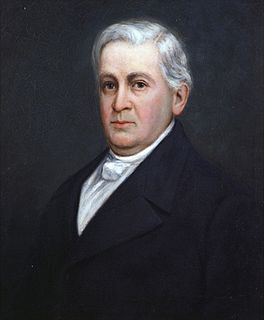 W
WGabriel Slaughter was the seventh Governor of Kentucky and was the first person to ascend to that office upon the death of the sitting governor. His family moved to Kentucky from Virginia when he was very young. He became a member of the Kentucky militia, serving throughout his political career. He received a citation from the state legislature in recognition of his service at the Battle of New Orleans.
 W
WJohn Speed Smith was an attorney and politician, a U.S. Representative from Kentucky, and a state representative for several terms, as well as state senator. He served for four years as a US District Attorney. He was the father of Green Clay Smith, who also served as a state representative and US Congressman.
 W
WJames Taylor V (1769–1848) was an American banker, Quartermaster general, and one of the wealthiest early settlers of Kentucky. He was a founder of the city of Newport, Kentucky.
 W
WRobert Smith Todd was an American lawyer, soldier, banker, businessman and politician who was the father of First Lady Mary Todd Lincoln.
 W
WJoseph Rogers Underwood was a lawyer, judge, United States Representative and Senator from Kentucky.
 W
WCharles Anderson Wickliffe was a U.S. Representative from Kentucky. He also served as Speaker of the Kentucky House of Representatives, the 14th Governor of Kentucky, and was appointed Postmaster General by President John Tyler. Though he consistently identified with the Whig Party, he was politically independent, and often had differences of opinion with Whig founder and fellow Kentuckian Henry Clay.
 W
WJames Wilkinson was an American soldier and statesman, who was associated with several scandals and controversies.